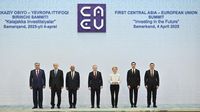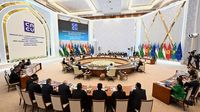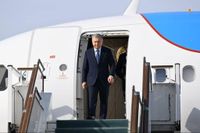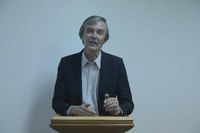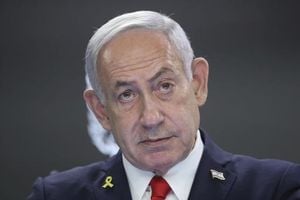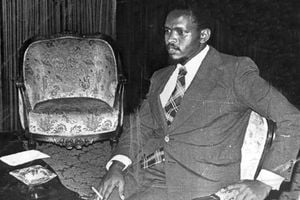In a historic gathering, the first official EU-Central Asia summit opened in Samarkand, Uzbekistan, underscoring the growing importance of economic ties between the European Union and the five Central Asian nations. As the region seeks to stabilize its relationships and enhance its economic potential, leaders from both sides convened to discuss critical issues related to trade and logistics.
The summit, attended by European Council President Antoniu Koshta and European Commission President Ursula von der Leyen, alongside the leaders of Uzbekistan, Kazakhstan, Kyrgyzstan, Tajikistan, and Turkmenistan, primarily focused on economic collaboration amid the backdrop of Russia's ongoing war against Ukraine. This geopolitical context has prompted the EU to expand its influence in Central Asia, a region rich in resources and strategic importance.
During the summit, Kazakhstan's Deputy Prime Minister Serik Zhumangarin emphasized the region's stability and its potential to contribute equally to strategic relations with Europe. "The main conclusion for us is that Central Asia is now perceived as a whole," Zhumangarin stated, highlighting the region's role as a reliable bridge between China, Southeast Asia, and Europe. He pointed out that Central Asia is not only a supplier of essential materials—including uranium, oil, and gas—but also critical food supplies like wheat.
One of the central themes of the summit was the EU's ambitious Global Gateway project, valued at 300 billion euros, aimed at developing the Trans-Caspian International Transport Corridor. This initiative is expected to significantly reduce transportation time between the EU and Central Asia to just 15 days. The Central Asian states are estimated to require 18.5 billion euros to enhance their infrastructure to support this project.
Over half of the necessary funding for this initiative was raised during an investment forum in Brussels in early 2024, which attracted participation from EU member states, private businesses, and major financial institutions like the European Investment Bank and the European Bank for Reconstruction and Development.
Uzbek President Shavkat Mirziyoyev, who hosted the summit, described it as a "historic chance" for Central Asia. He noted that trade between the region and the EU has quadrupled over the past seven years, now reaching 54 billion euros. Mirziyoyev proposed the creation of a "green strategic corridor" for energy cooperation with Europe, aiming to support the region's transition to environmentally friendly energy sources.
In a pre-summit interview with Euronews, Mirziyoyev outlined key discussion points, including economics, trade, energy, and transport. He expressed hopes for deepening political dialogue and establishing new mechanisms for cooperation that would enhance long-term collaboration.
However, the summit also brought to light concerns regarding human rights in the region. International human rights organizations urged European leaders not to overlook the ongoing issues of human rights abuses in Central Asian countries. Human Rights Watch reminded officials that all five governments have histories of repressing dissent and enacting restrictive laws. The director of the International Partnership for Human Rights, Brigitte Dufour, emphasized that while the EU strengthens its strategic partnerships in areas like energy and security, it must also uphold human rights as a fundamental principle in its dealings with Central Asia.
Amid these discussions, analysts provided insights into the potential outcomes of the summit. Turkmen analyst Ruslan Myatiev noted that the summit signals Europe's openness to Central Asia. He pointed out that there are already programs in place allowing Uzbek labor migrants to work legally in EU countries, addressing Europe's labor shortages while providing economic support to families back home.
Kazakh political scientist Kazbek Beisebayev remarked on the heightened interest in Central Asia from Europe, particularly as these nations possess significant economic potential. He highlighted the need for European investments and technology to foster growth in the region. Beisebayev noted that the recent diplomatic engagements between EU representatives and Central Asian leaders indicate a mutual interest in strengthening economic ties.
As the summit progresses, the leaders are expected to sign the Samarkand Declaration, which will reflect their collective desire to establish a strategic partnership. This declaration is anticipated to lay the groundwork for future collaboration, reinforcing the commitment to mutual development and cooperation.
With the backdrop of historical trade routes that once connected Europe and Asia, the summit in Samarkand symbolizes a renewed commitment to fostering economic ties that could benefit both the EU and Central Asia. As the region seeks to navigate its path toward stability and growth, the outcomes of this summit may very well shape the future of EU-Central Asia relations.
As discussions continue, the world watches closely to see how this partnership will evolve and what it means for the broader geopolitical landscape in light of ongoing global challenges.
